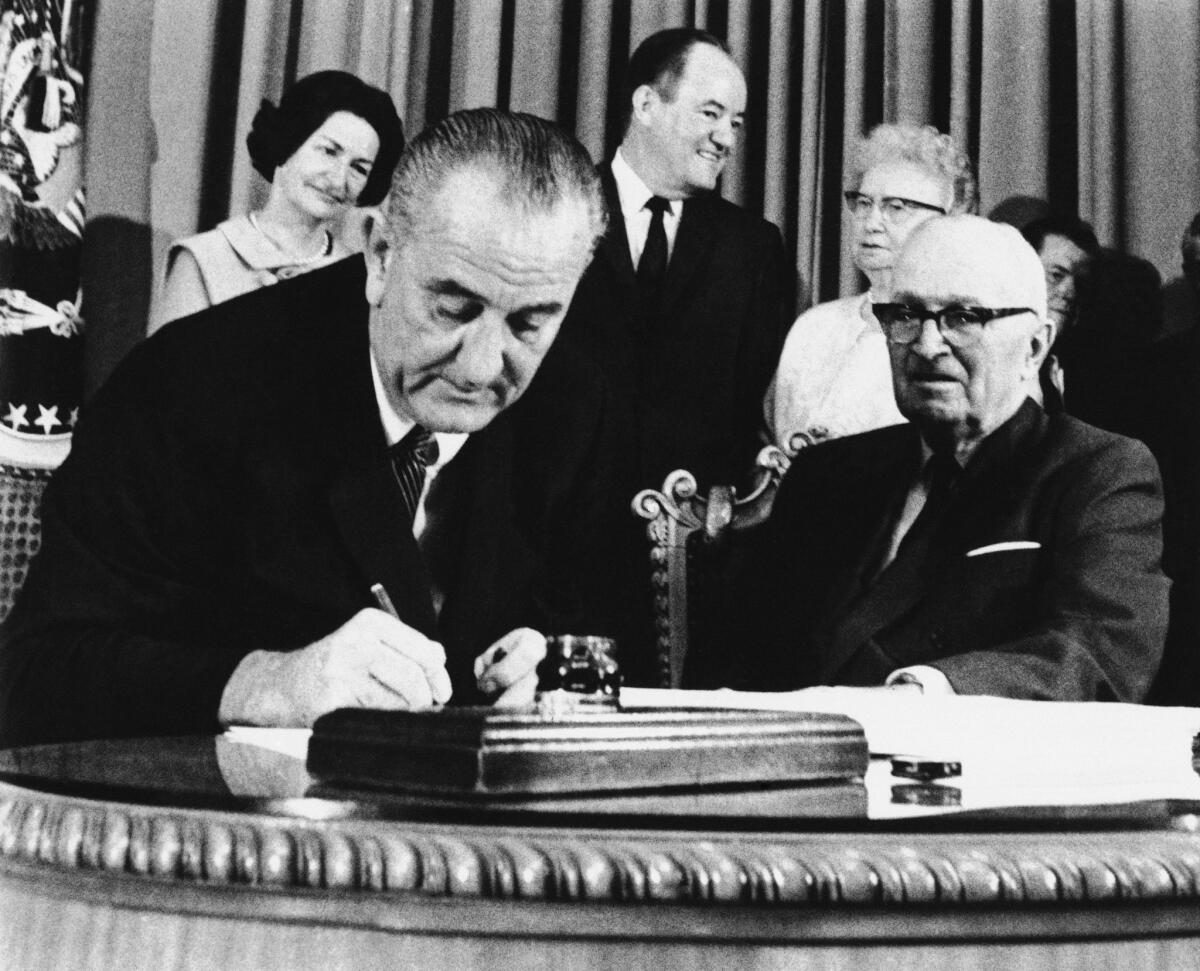How Medicare fulfilled a president’s half-century-old promise

President Lyndon Johnson signed Medicare into law 50 years ago Thursday alongside former President Truman at a ceremony at the Truman Library in Independence, Mo. At rear are Lady Bird Johnson, Vice President Hubert Humphrey and former First Lady Bess Truman.
- Share via
Reporting from Washington — Half a century after President Lyndon Johnson signed legislation creating Medicare and Medicaid with a pledge that seniors no longer would “be denied the healing miracle of modern medicine,” the promise has been largely fulfilled.
The two entitlements – one for the elderly and one for low-income Americans - have kept generations of seniors in their homes and extended life-saving insurance protections to poor children and families. The share of uninsured seniors, which was 48% in 1962, is now less than 2%.
Yet, the two programs today look far different than they did in 1965, as Democrats and Republicans have each expanded and reshaped them over the last five decades.
The evolution has been at times contentious, and often unexpected, with GOP presidents presiding over some of the biggest expansions of the government healthcare plans.
That history may offer clues about what lies ahead for the sweeping health law that President Obama enacted in 2010.
“It will be very hard to pick apart the Affordable Care Act,” said Commonwealth Fund President Dr. David Blumenthal, who has written extensively about U.S. healthcare history. “But I expect there will be efforts to reduce its scope and to expand it.… That tension will shape the law for generations to come.”
Not unlike the 2010 law, Medicare and Medicaid were the product of years-long political battling, intense industry lobbying and hyperbolic rhetoric, including charges from the American Medical Assn. and other critics that a government health plan for the elderly would pave the way to communism.
“The attacks were vicious,” said Julian Zelizer, a Princeton historian and author of a recent book about how Medicare and other Great Society programs were crafted in the mid-’60s.
To mollify opponents, the architects of Medicare and Medicaid deliberately limited the two programs at first.
Medicare, for example, didn’t cover prescription drugs. It didn’t even set medical fees, allowing physicians to set their own rates.
For its part, Medicaid, which was run by states, was initially envisioned only as coverage for very low-income mothers and children receiving cash welfare.
And federal lawmakers gave states broad discretion whether to even set up a program. (It was not until 1982, when Arizona joined, that all 50 states adopted Medicaid.)
“For years, it was a poor program for poor people,” said Columbia University’s Michael Sparer, a leading Medicaid scholar. “It was really an afterthought.”
It didn’t remain so. Medicaid, which covered fewer than 20 million people in 1970, now insures close to 70 million, as state and federal officials from both political parties collaborated over the years to steadily make more Americans eligible.
Through the ’80s, for example, Southern governors who were worried about high infant mortality pushed Democrats and Republicans in Washington to bring pregnant women and more children into the program.
In the ’90s, children from working-class families were brought into government coverage as President Clinton, a Democrat, and congressional Republicans created the State Children’s Health Insurance Program.
Some states went further still, expanding government coverage to poor adults without children, a population shut out of Medicaid in most states.
The Affordable Care Act extended these protections again, as 30 states have now elected to take federal aid made available by the law to insure childless adults.
Medicare, which now covers about 55 million people, has added new groups too, including disabled Americans.
It has also added benefits. In 2003, President George W. Bush, a Republican, pushed through a prescription drug benefit, the single largest expansion of services in Medicare’s history.
Republicans also have battled with Democrats for more use of commercial insurers in Medicare, a campaign that led to the steady expansion of the Medicare Advantage program. (A similar development has unfolded in Medicaid, which relies increasingly on private managed care companies to administer coverage.)
Even more profoundly, Medicare abandoned its hands-off approach to physicians and hospitals, starting most dramatically under another Republican, President Reagan.
Since the ’80s, the federal government has used its power as the largest single payer for healthcare to drive medical providers around the country to improve quality and efficiency.
“We’ve had Republican presidents expanding benefits and imposing cost controls,” said University of North Carolina political scientist Jonathan Oberlander, a Medicare authority. “The politics of Medicare aren’t entirely predictable.”
Today, Medicare and Medicaid are behemoths, covering one in three Americans with a combined annual budget of more than $1 trillion.
The rising tab is a persistent source of concern, particularly for conservatives. But the programs remain very popular.
More than three-quarters of Americans in a recent nationwide poll by the Kaiser Family Foundation said Medicare is “very important.” Nearly two-thirds said the same about Medicaid.
Whether the Affordable Care Act will follow a similar trajectory remains unclear.
Unlike Medicare and Medicaid, which were ultimately backed by Republicans and implemented with relatively little controversy, the 2010 law remains deeply polarizing, even five years after its enactment.
But around the country, there are some signs that GOP officials are quietly making accommodations, and even putting a conservative stamp on elements of the law, such as the Medicaid expansion.
“Once you have government insurance programs, they tend to stay around,” said Oberlander. “Lots of people have screamed about socialized medicine over the years, yet on marched Medicare and Medicaid.”
More to Read
Sign up for Essential California
The most important California stories and recommendations in your inbox every morning.
You may occasionally receive promotional content from the Los Angeles Times.











